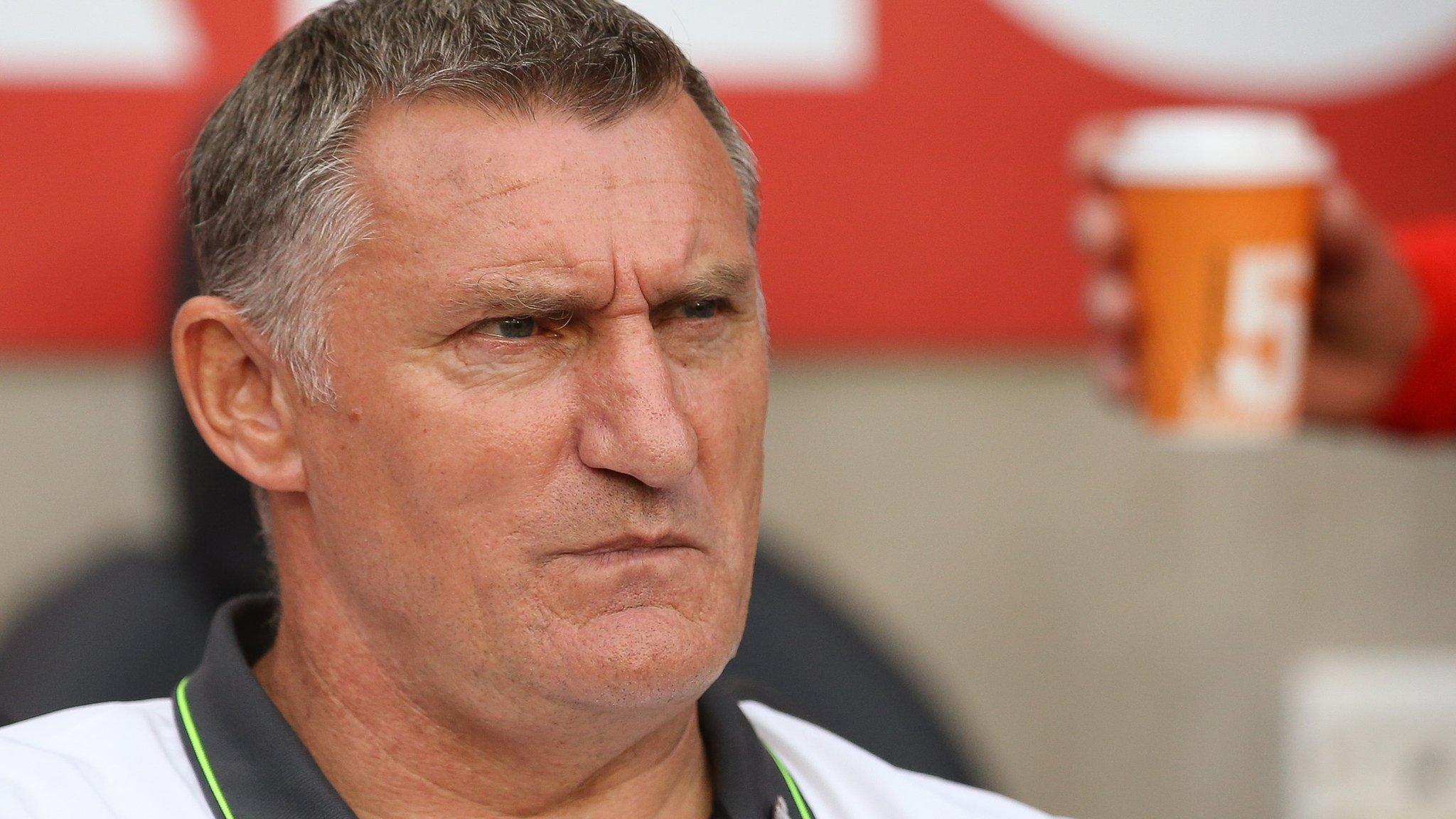Blackburn Rovers promoted: How Tony Mowbray turned club and his own career around
- Published
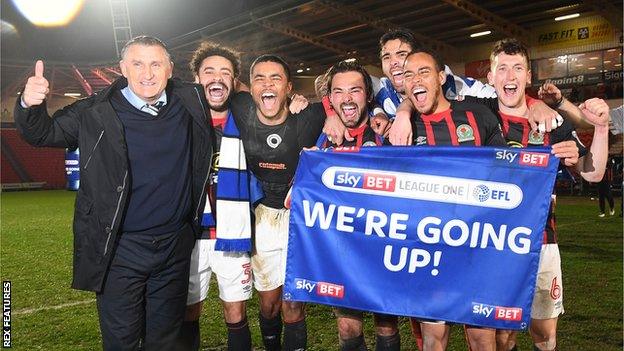
Blackburn Rovers celebrate promotion back to the Championship at the first time of asking
"I got a lot of texts when I took this job from a lot of very experienced people saying I was a glutton for punishment."
Speaking to BBC One's Football Focus before Blackburn Rovers' last game of the 2016-17 Championship season, Tony Mowbray and his side were staring down the barrel of relegation to League One.
Rovers were an established Premier League club at the start of the decade, but the drop to the third tier rounded off a miserable few years containing countless managers, protests from fans against owners Venky's, expensive transfer failures and spiralling debt.
It was an all-too familiar scenario for a manager who had started that season at another club, in Coventry, with well-publicised ownership and financial issues of their own.
Since his appointment in February 2017 as Rovers' seventh boss in five seasons however, Mowbray has overseen a change in fortunes at Ewood Park.
He has led them back to the second tier at the first time of asking thanks to victory against Doncaster on Tuesday, but how has he turned the club and his own career around?
Adapting to the third tier
Former West Bromwich Albion, Celtic and Middlesbrough boss Mowbray joined Blackburn five months after resigning as manager of the Sky Blues.
Blackburn took 22 points from their final 15 Championship matches, more than any other team in the bottom seven, but even that was not enough to survive.
They beat Brentford 3-1 away from home on a frantic final day of the season, but Rovers were relegated to the third tier on goal difference after Nottingham Forest and Birmingham City also won.
An immediate promotion back to the second tier looked a long way away in October when Rovers lost 1-0 at Oldham, leaving them 10th in the table and 12 points off leaders Wigan and second-placed Shrewsbury.
But it was season-defining. Since that defeat, they have lost just once in League One.
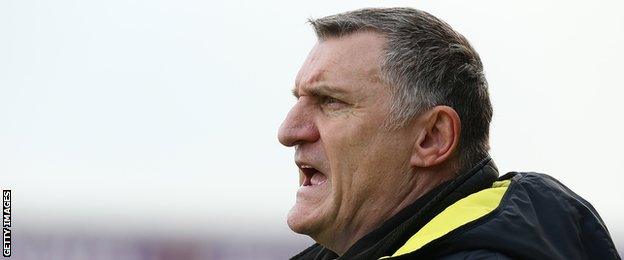
Tony Mowbray has won 36 of his 68 games in charge of Blackburn Rovers
"I think we've found different ways to win games. We talked early in the season about our defence and we've been playing a little bit deeper and on the counter attack to score in transition since," Mowbray told BBC Radio Lancashire.
"The Oldham game changed the way we played. We had to be more positive in this league and stop letting teams that weren't as good or had as good players as us have too much of the ball against us.
"After 12 games we were well behind Wigan and Shrewsbury so in the last 30-odd games we accrued a lot of points. It did take some time to acclimatise to the league and the new players needed time to settle in.
"We stepped higher up the pitch and started scoring a lot of goals and that's given us confidence."
Rebuilding a disconnect with the fans
Since buying the club in 2010, owners Venky's have had a fractured relationship with Rovers' fan base - heightened during the club's slide from the Premier League to the third tier during their eight years at the helm.
Some Blackburn supporters have protested and organised boycotts against the owners since their arrival and there were fears that the 1994-95 Premier League champions could slip into further financial trouble after their relegation last season.
Local businessmen Ian Battersby and Ian Currie, through their company Seneca Partners, contacted Venky's with a joint-ownership proposal in May 2016 that was rejected, while debts have also risen to more than £100m since the club lost their Premier League status in 2012.
After being given "full support" by Venky's after their relegation, Mowbray may have turned the club's form around, but has he managed to win over the fans with his side's consistent form leading them to promotion?
"He's the first manager in this ownership who's expressed empathy towards the supporters. No one has ever reached out to the extent that Mowbray has," Oliver Jones, vice chairman of the Rovers Trust, told BBC Sport.
"Increasingly since relegation from the Premier League, we've heard less and less from the owners. We finally got lucky with a manager who's taken us up but from a supporters' trust point of view, we've hived off concentrating on the ownership.
"We can't keep having that monkey around our neck and it hanging over us all the time. Promotion is the first major step forward in seven years of ownership but bizarrely it's after 18 months of no noise from them."
Mowbray, meanwhile, is happy that one of his teams have enjoyed a successful campaign, despite the club having a fan base that is hard to please.
"Football is difficult because fans generally expect you to win and (when you lose) the newspapers, the phone-ins and the shows are all negative, whether your budget's the lowest or highest in the league," Mowbray continued.
"But it's actually been nice to be competitive in this division and they've had to step up to the mark."
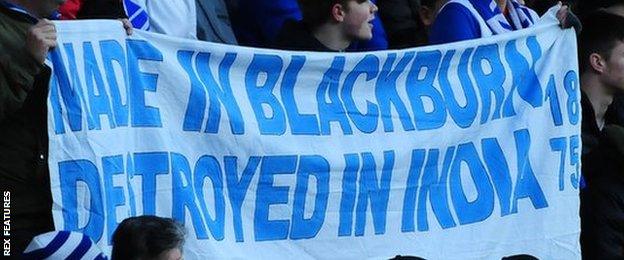
Blackburn fans have protested regularly against owners Venky's, run by the Rao family, throughout their time at the club
Rebuilding his career
After the chaos of relegation last season, Mowbray has kept key players and shored up the beleaguered club with some astute signings.
Despite not spending much of the £20m brought in from the sales of Jordan Rhodes, Rudy Gestede, Tom Cairney, Grant Hanley and Shane Duffy in seasons gone by, Mowbray has brought in Gillingham's Bradley Dack for £750,000 as well as striker Dominic Samuel and defender Amari'i Bell to aid their push for promotion.
Dack, who has contributed 18 goals from midfield, was named League One Player of the Year at the English Football League Awards earlier this month.
Mowbray enjoyed success early in his managerial career with Hibernian, guiding the Edinburgh club to back-to-back top-four finishes for the first time in more than 30 years, before winning the Championship title with West Brom in 2008 with a brand of eye-catching football.
But relative failures followed at Celtic and Middlesbrough - both clubs where he had hero status as a player - as well as Coventry, where his side suffered a late-season slump to miss out on promotion from League One in his only full season in charge.
"I've enjoyed the fact that we've had a team with players that can win games. I've managed clubs where realistically it's been very difficult to get into the top two or top six," Mowbray continued.
"I've sat in offices after games and thought 'I wish we had the budget' or 'I wish we had the players' and I've been on the other end of it."
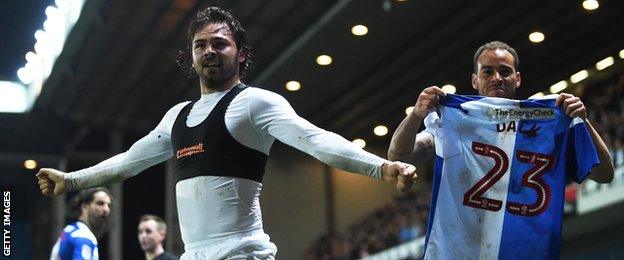
Bradley Dack has scored 18 goals in his debut season with Blackburn Rovers after joining from Gillingham
'Fans can be proud of Mowbray's team'
Analysis: BBC Radio Lancashire's Andy Bayes
After taking a little while to settle in to life in League One, Rovers fully deserve the position that they find themselves in. One defeat since 14 October in the league is promotion form in anyone's book.
The appointment of Mowbray has brought authority, leadership and a degree of calmness to a club that was crying out for it.
Mowbray oversaw the departures of 12 senior players and replaced them with ones he had either worked with before or been impressed by when he was in charge of Coventry.
He has found a position for Dack to flourish. Experienced players like Danny Graham and Charlie Mulgrew have been crucial to the cause, in Graham's case particularly since the turn of the year.
Mulgrew's 14 goals this season have been the most by a defender in one season in the club's history and if Adam Armstrong scores once more, it would be the first time in 60 years that four players have reached double figures in the same season.
Rovers have had much publicised problems over recent years but Mowbray has created a team that the long-suffering fans can be proud of. Now they are over the line, he will not be settling for just making up the numbers in the second tier.
He has become a very popular manager in a relatively short space of time. Supporters feel that he is sensible and realistic about his objectives for the club and hope that moving back to the Championship is only the start.
- Published24 April 2018
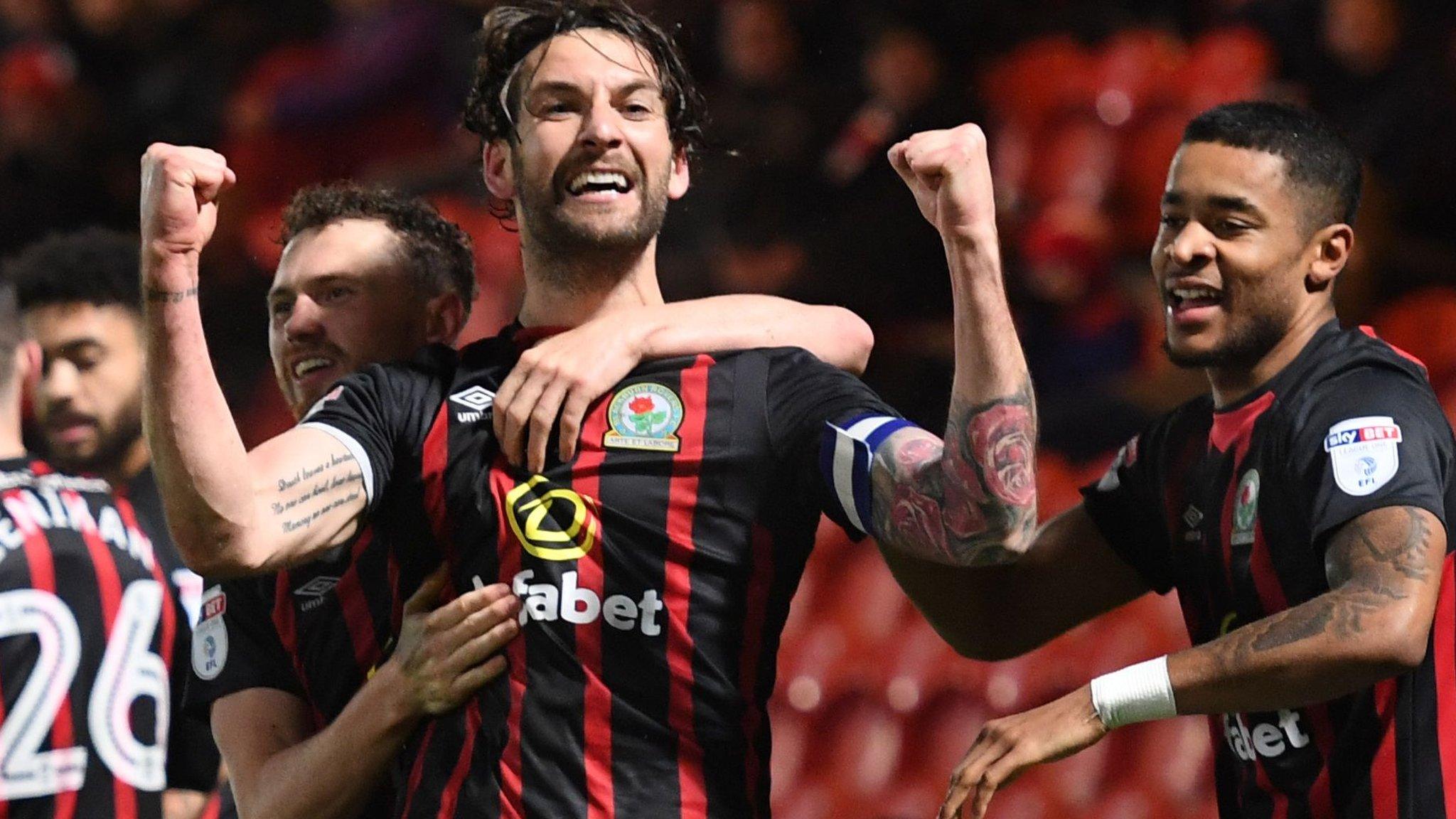
- Published8 May 2017
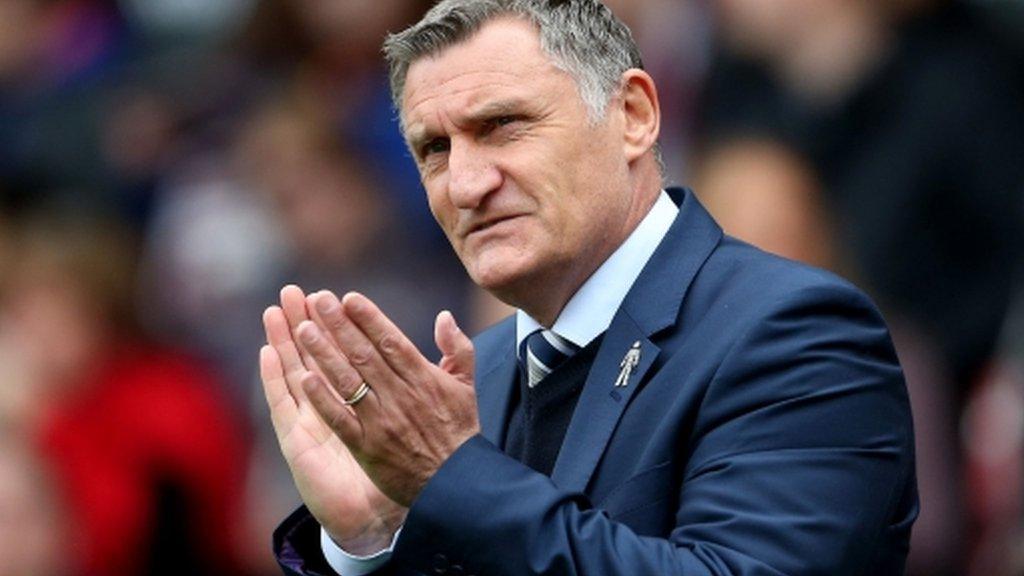
- Published22 February 2017
